BUS703 Managing Research: Evaluating Leadership Coaching Study
VerifiedAdded on 2023/06/11
|10
|2466
|288
Report
AI Summary
This report provides a critical evaluation of a research article focusing on leadership coaching, leader role-efficacy (LRE), and trust in subordinates (LTS). The evaluation encompasses the literature review, research design (mixed methods), focus group analysis, and the overall effectiveness of the study in fulfilling its objectives. The research utilizes a two-phase sequential exploratory design, combining qualitative and quantitative methods to assess leadership coaching as a leadership development tool. The focus group discussion provides in-depth insights into the challenges faced by leaders, and the quasi-experimental field study involves leaders and their subordinates. The report identifies that while leadership coaching is associated with increased LRE, its impact on LTS is less clear. The evaluation concludes by assessing the extent to which the study's objectives were met, noting the strengths and limitations of the research design and methodology. Desklib offers this assignment solution and many more to help students.
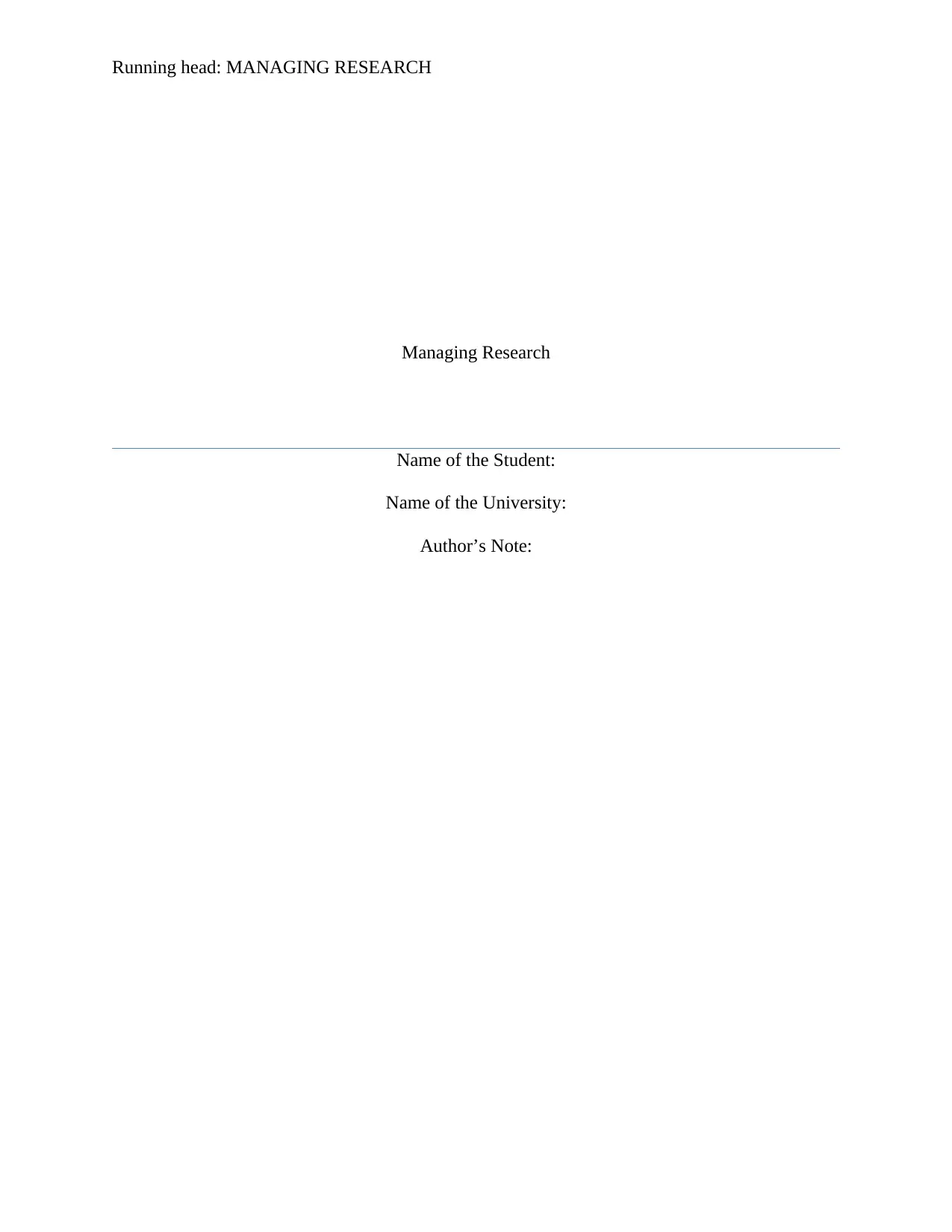
Running head: MANAGING RESEARCH
Managing Research
Name of the Student:
Name of the University:
Author’s Note:
Managing Research
Name of the Student:
Name of the University:
Author’s Note:
Paraphrase This Document
Need a fresh take? Get an instant paraphrase of this document with our AI Paraphraser
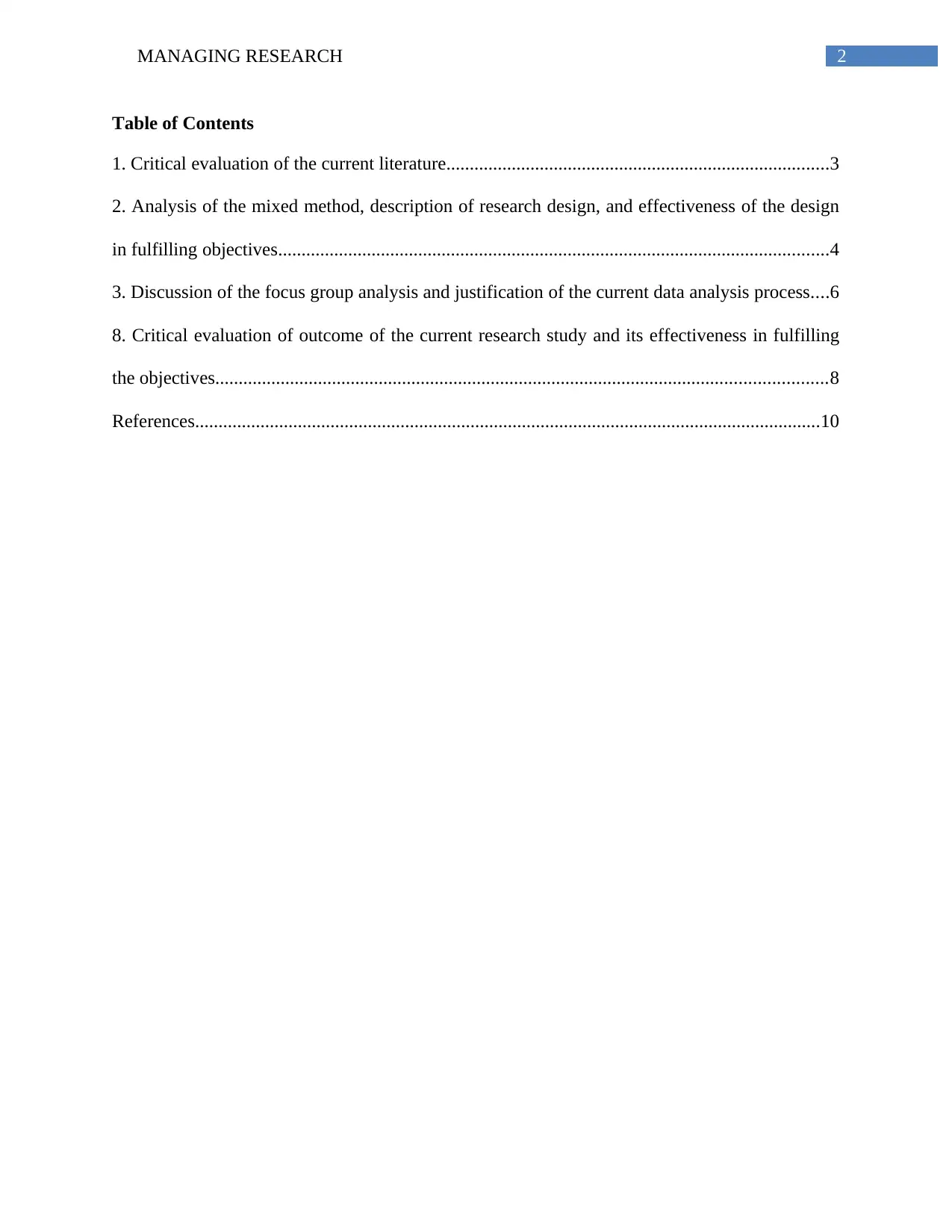
2MANAGING RESEARCH
Table of Contents
1. Critical evaluation of the current literature..................................................................................3
2. Analysis of the mixed method, description of research design, and effectiveness of the design
in fulfilling objectives......................................................................................................................4
3. Discussion of the focus group analysis and justification of the current data analysis process....6
8. Critical evaluation of outcome of the current research study and its effectiveness in fulfilling
the objectives...................................................................................................................................8
References......................................................................................................................................10
Table of Contents
1. Critical evaluation of the current literature..................................................................................3
2. Analysis of the mixed method, description of research design, and effectiveness of the design
in fulfilling objectives......................................................................................................................4
3. Discussion of the focus group analysis and justification of the current data analysis process....6
8. Critical evaluation of outcome of the current research study and its effectiveness in fulfilling
the objectives...................................................................................................................................8
References......................................................................................................................................10
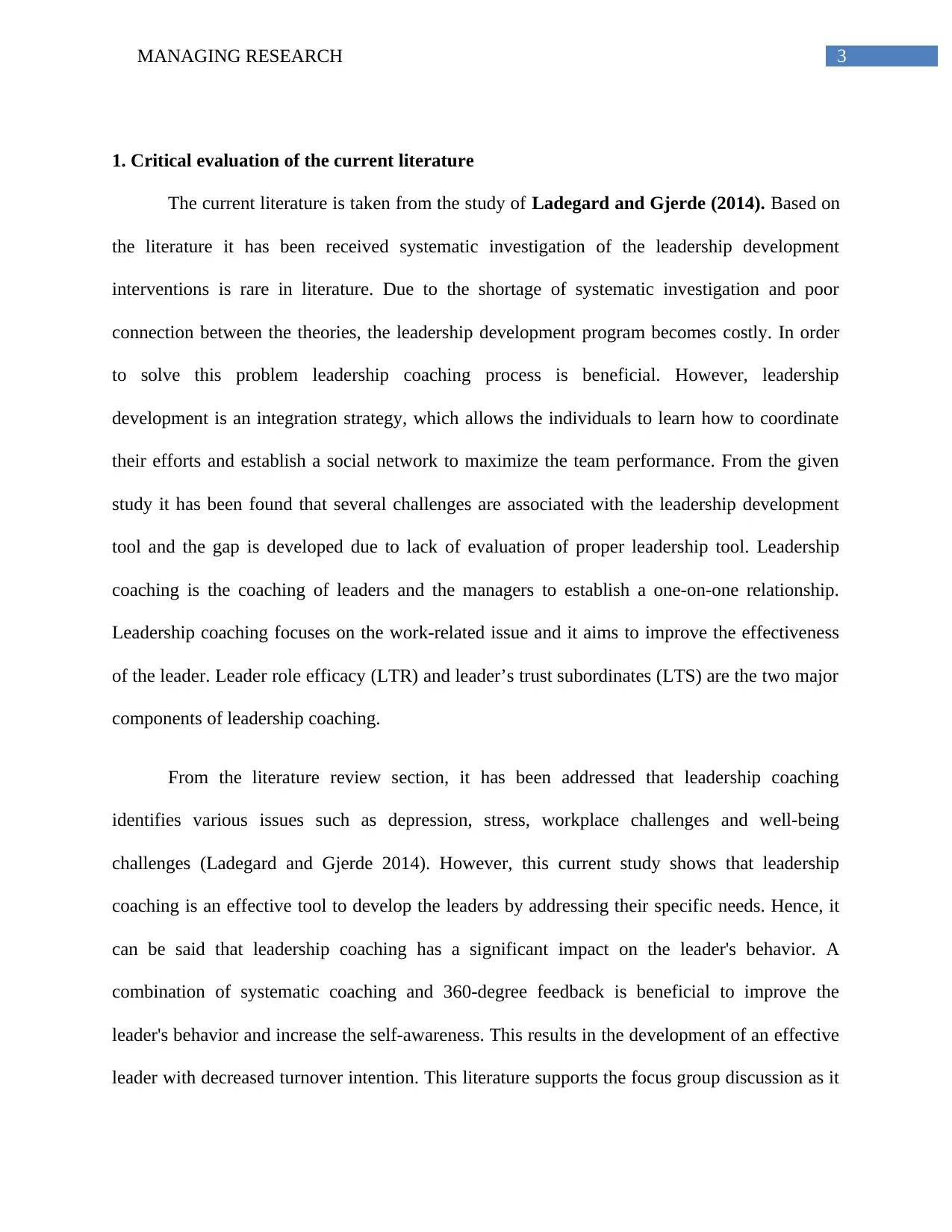
3MANAGING RESEARCH
1. Critical evaluation of the current literature
The current literature is taken from the study of Ladegard and Gjerde (2014). Based on
the literature it has been received systematic investigation of the leadership development
interventions is rare in literature. Due to the shortage of systematic investigation and poor
connection between the theories, the leadership development program becomes costly. In order
to solve this problem leadership coaching process is beneficial. However, leadership
development is an integration strategy, which allows the individuals to learn how to coordinate
their efforts and establish a social network to maximize the team performance. From the given
study it has been found that several challenges are associated with the leadership development
tool and the gap is developed due to lack of evaluation of proper leadership tool. Leadership
coaching is the coaching of leaders and the managers to establish a one-on-one relationship.
Leadership coaching focuses on the work-related issue and it aims to improve the effectiveness
of the leader. Leader role efficacy (LTR) and leader’s trust subordinates (LTS) are the two major
components of leadership coaching.
From the literature review section, it has been addressed that leadership coaching
identifies various issues such as depression, stress, workplace challenges and well-being
challenges (Ladegard and Gjerde 2014). However, this current study shows that leadership
coaching is an effective tool to develop the leaders by addressing their specific needs. Hence, it
can be said that leadership coaching has a significant impact on the leader's behavior. A
combination of systematic coaching and 360-degree feedback is beneficial to improve the
leader's behavior and increase the self-awareness. This results in the development of an effective
leader with decreased turnover intention. This literature supports the focus group discussion as it
1. Critical evaluation of the current literature
The current literature is taken from the study of Ladegard and Gjerde (2014). Based on
the literature it has been received systematic investigation of the leadership development
interventions is rare in literature. Due to the shortage of systematic investigation and poor
connection between the theories, the leadership development program becomes costly. In order
to solve this problem leadership coaching process is beneficial. However, leadership
development is an integration strategy, which allows the individuals to learn how to coordinate
their efforts and establish a social network to maximize the team performance. From the given
study it has been found that several challenges are associated with the leadership development
tool and the gap is developed due to lack of evaluation of proper leadership tool. Leadership
coaching is the coaching of leaders and the managers to establish a one-on-one relationship.
Leadership coaching focuses on the work-related issue and it aims to improve the effectiveness
of the leader. Leader role efficacy (LTR) and leader’s trust subordinates (LTS) are the two major
components of leadership coaching.
From the literature review section, it has been addressed that leadership coaching
identifies various issues such as depression, stress, workplace challenges and well-being
challenges (Ladegard and Gjerde 2014). However, this current study shows that leadership
coaching is an effective tool to develop the leaders by addressing their specific needs. Hence, it
can be said that leadership coaching has a significant impact on the leader's behavior. A
combination of systematic coaching and 360-degree feedback is beneficial to improve the
leader's behavior and increase the self-awareness. This results in the development of an effective
leader with decreased turnover intention. This literature supports the focus group discussion as it
⊘ This is a preview!⊘
Do you want full access?
Subscribe today to unlock all pages.

Trusted by 1+ million students worldwide
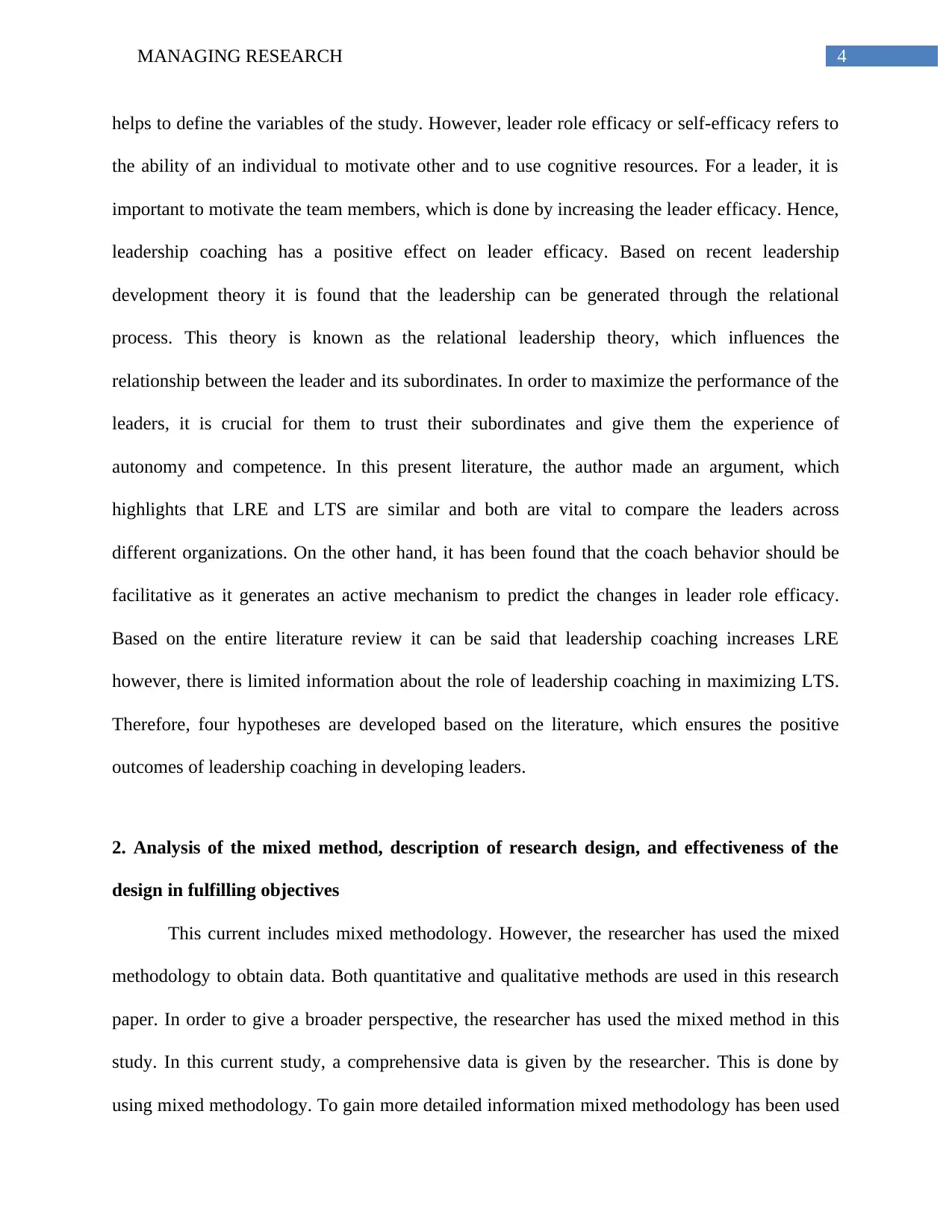
4MANAGING RESEARCH
helps to define the variables of the study. However, leader role efficacy or self-efficacy refers to
the ability of an individual to motivate other and to use cognitive resources. For a leader, it is
important to motivate the team members, which is done by increasing the leader efficacy. Hence,
leadership coaching has a positive effect on leader efficacy. Based on recent leadership
development theory it is found that the leadership can be generated through the relational
process. This theory is known as the relational leadership theory, which influences the
relationship between the leader and its subordinates. In order to maximize the performance of the
leaders, it is crucial for them to trust their subordinates and give them the experience of
autonomy and competence. In this present literature, the author made an argument, which
highlights that LRE and LTS are similar and both are vital to compare the leaders across
different organizations. On the other hand, it has been found that the coach behavior should be
facilitative as it generates an active mechanism to predict the changes in leader role efficacy.
Based on the entire literature review it can be said that leadership coaching increases LRE
however, there is limited information about the role of leadership coaching in maximizing LTS.
Therefore, four hypotheses are developed based on the literature, which ensures the positive
outcomes of leadership coaching in developing leaders.
2. Analysis of the mixed method, description of research design, and effectiveness of the
design in fulfilling objectives
This current includes mixed methodology. However, the researcher has used the mixed
methodology to obtain data. Both quantitative and qualitative methods are used in this research
paper. In order to give a broader perspective, the researcher has used the mixed method in this
study. In this current study, a comprehensive data is given by the researcher. This is done by
using mixed methodology. To gain more detailed information mixed methodology has been used
helps to define the variables of the study. However, leader role efficacy or self-efficacy refers to
the ability of an individual to motivate other and to use cognitive resources. For a leader, it is
important to motivate the team members, which is done by increasing the leader efficacy. Hence,
leadership coaching has a positive effect on leader efficacy. Based on recent leadership
development theory it is found that the leadership can be generated through the relational
process. This theory is known as the relational leadership theory, which influences the
relationship between the leader and its subordinates. In order to maximize the performance of the
leaders, it is crucial for them to trust their subordinates and give them the experience of
autonomy and competence. In this present literature, the author made an argument, which
highlights that LRE and LTS are similar and both are vital to compare the leaders across
different organizations. On the other hand, it has been found that the coach behavior should be
facilitative as it generates an active mechanism to predict the changes in leader role efficacy.
Based on the entire literature review it can be said that leadership coaching increases LRE
however, there is limited information about the role of leadership coaching in maximizing LTS.
Therefore, four hypotheses are developed based on the literature, which ensures the positive
outcomes of leadership coaching in developing leaders.
2. Analysis of the mixed method, description of research design, and effectiveness of the
design in fulfilling objectives
This current includes mixed methodology. However, the researcher has used the mixed
methodology to obtain data. Both quantitative and qualitative methods are used in this research
paper. In order to give a broader perspective, the researcher has used the mixed method in this
study. In this current study, a comprehensive data is given by the researcher. This is done by
using mixed methodology. To gain more detailed information mixed methodology has been used
Paraphrase This Document
Need a fresh take? Get an instant paraphrase of this document with our AI Paraphraser
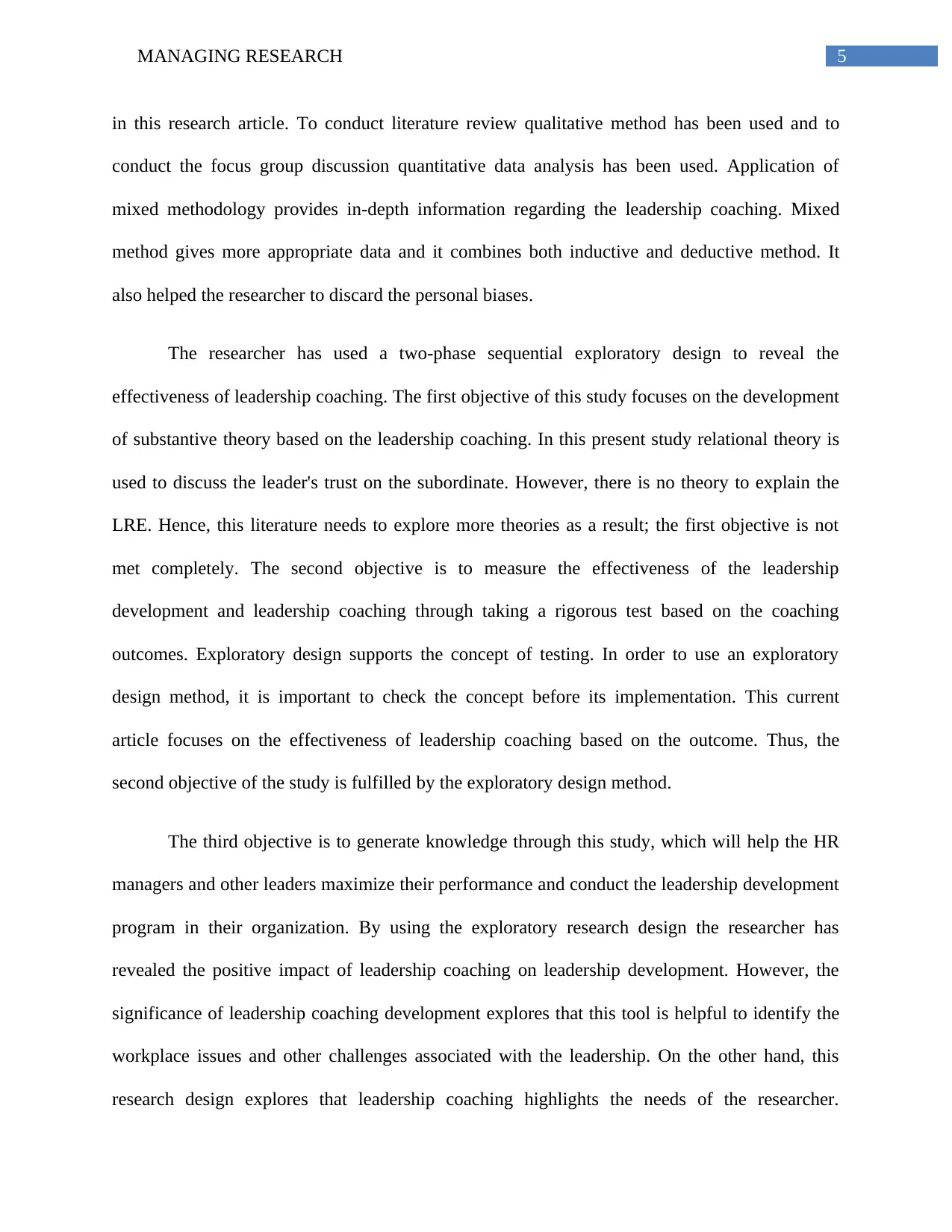
5MANAGING RESEARCH
in this research article. To conduct literature review qualitative method has been used and to
conduct the focus group discussion quantitative data analysis has been used. Application of
mixed methodology provides in-depth information regarding the leadership coaching. Mixed
method gives more appropriate data and it combines both inductive and deductive method. It
also helped the researcher to discard the personal biases.
The researcher has used a two-phase sequential exploratory design to reveal the
effectiveness of leadership coaching. The first objective of this study focuses on the development
of substantive theory based on the leadership coaching. In this present study relational theory is
used to discuss the leader's trust on the subordinate. However, there is no theory to explain the
LRE. Hence, this literature needs to explore more theories as a result; the first objective is not
met completely. The second objective is to measure the effectiveness of the leadership
development and leadership coaching through taking a rigorous test based on the coaching
outcomes. Exploratory design supports the concept of testing. In order to use an exploratory
design method, it is important to check the concept before its implementation. This current
article focuses on the effectiveness of leadership coaching based on the outcome. Thus, the
second objective of the study is fulfilled by the exploratory design method.
The third objective is to generate knowledge through this study, which will help the HR
managers and other leaders maximize their performance and conduct the leadership development
program in their organization. By using the exploratory research design the researcher has
revealed the positive impact of leadership coaching on leadership development. However, the
significance of leadership coaching development explores that this tool is helpful to identify the
workplace issues and other challenges associated with the leadership. On the other hand, this
research design explores that leadership coaching highlights the needs of the researcher.
in this research article. To conduct literature review qualitative method has been used and to
conduct the focus group discussion quantitative data analysis has been used. Application of
mixed methodology provides in-depth information regarding the leadership coaching. Mixed
method gives more appropriate data and it combines both inductive and deductive method. It
also helped the researcher to discard the personal biases.
The researcher has used a two-phase sequential exploratory design to reveal the
effectiveness of leadership coaching. The first objective of this study focuses on the development
of substantive theory based on the leadership coaching. In this present study relational theory is
used to discuss the leader's trust on the subordinate. However, there is no theory to explain the
LRE. Hence, this literature needs to explore more theories as a result; the first objective is not
met completely. The second objective is to measure the effectiveness of the leadership
development and leadership coaching through taking a rigorous test based on the coaching
outcomes. Exploratory design supports the concept of testing. In order to use an exploratory
design method, it is important to check the concept before its implementation. This current
article focuses on the effectiveness of leadership coaching based on the outcome. Thus, the
second objective of the study is fulfilled by the exploratory design method.
The third objective is to generate knowledge through this study, which will help the HR
managers and other leaders maximize their performance and conduct the leadership development
program in their organization. By using the exploratory research design the researcher has
revealed the positive impact of leadership coaching on leadership development. However, the
significance of leadership coaching development explores that this tool is helpful to identify the
workplace issues and other challenges associated with the leadership. On the other hand, this
research design explores that leadership coaching highlights the needs of the researcher.
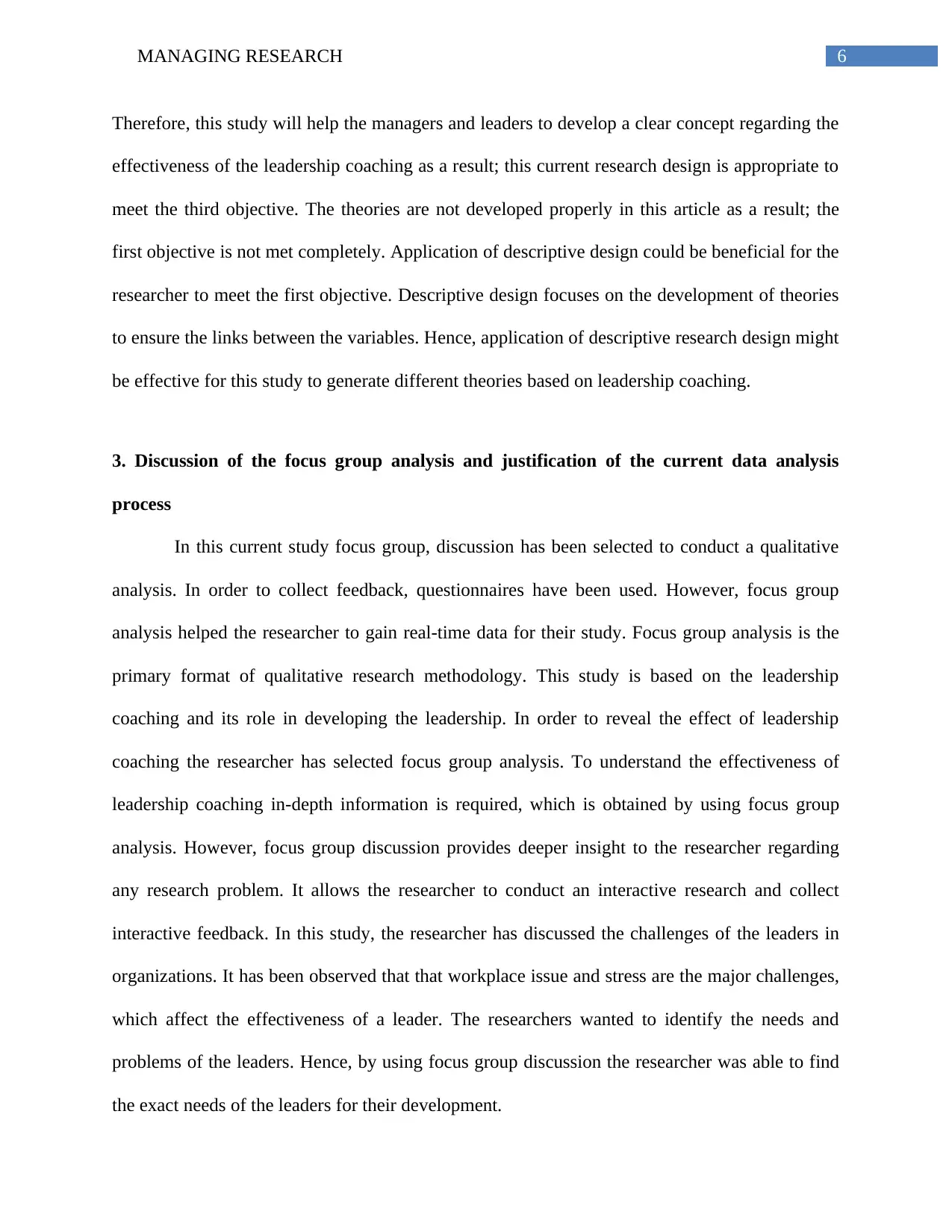
6MANAGING RESEARCH
Therefore, this study will help the managers and leaders to develop a clear concept regarding the
effectiveness of the leadership coaching as a result; this current research design is appropriate to
meet the third objective. The theories are not developed properly in this article as a result; the
first objective is not met completely. Application of descriptive design could be beneficial for the
researcher to meet the first objective. Descriptive design focuses on the development of theories
to ensure the links between the variables. Hence, application of descriptive research design might
be effective for this study to generate different theories based on leadership coaching.
3. Discussion of the focus group analysis and justification of the current data analysis
process
In this current study focus group, discussion has been selected to conduct a qualitative
analysis. In order to collect feedback, questionnaires have been used. However, focus group
analysis helped the researcher to gain real-time data for their study. Focus group analysis is the
primary format of qualitative research methodology. This study is based on the leadership
coaching and its role in developing the leadership. In order to reveal the effect of leadership
coaching the researcher has selected focus group analysis. To understand the effectiveness of
leadership coaching in-depth information is required, which is obtained by using focus group
analysis. However, focus group discussion provides deeper insight to the researcher regarding
any research problem. It allows the researcher to conduct an interactive research and collect
interactive feedback. In this study, the researcher has discussed the challenges of the leaders in
organizations. It has been observed that that workplace issue and stress are the major challenges,
which affect the effectiveness of a leader. The researchers wanted to identify the needs and
problems of the leaders. Hence, by using focus group discussion the researcher was able to find
the exact needs of the leaders for their development.
Therefore, this study will help the managers and leaders to develop a clear concept regarding the
effectiveness of the leadership coaching as a result; this current research design is appropriate to
meet the third objective. The theories are not developed properly in this article as a result; the
first objective is not met completely. Application of descriptive design could be beneficial for the
researcher to meet the first objective. Descriptive design focuses on the development of theories
to ensure the links between the variables. Hence, application of descriptive research design might
be effective for this study to generate different theories based on leadership coaching.
3. Discussion of the focus group analysis and justification of the current data analysis
process
In this current study focus group, discussion has been selected to conduct a qualitative
analysis. In order to collect feedback, questionnaires have been used. However, focus group
analysis helped the researcher to gain real-time data for their study. Focus group analysis is the
primary format of qualitative research methodology. This study is based on the leadership
coaching and its role in developing the leadership. In order to reveal the effect of leadership
coaching the researcher has selected focus group analysis. To understand the effectiveness of
leadership coaching in-depth information is required, which is obtained by using focus group
analysis. However, focus group discussion provides deeper insight to the researcher regarding
any research problem. It allows the researcher to conduct an interactive research and collect
interactive feedback. In this study, the researcher has discussed the challenges of the leaders in
organizations. It has been observed that that workplace issue and stress are the major challenges,
which affect the effectiveness of a leader. The researchers wanted to identify the needs and
problems of the leaders. Hence, by using focus group discussion the researcher was able to find
the exact needs of the leaders for their development.
⊘ This is a preview!⊘
Do you want full access?
Subscribe today to unlock all pages.

Trusted by 1+ million students worldwide
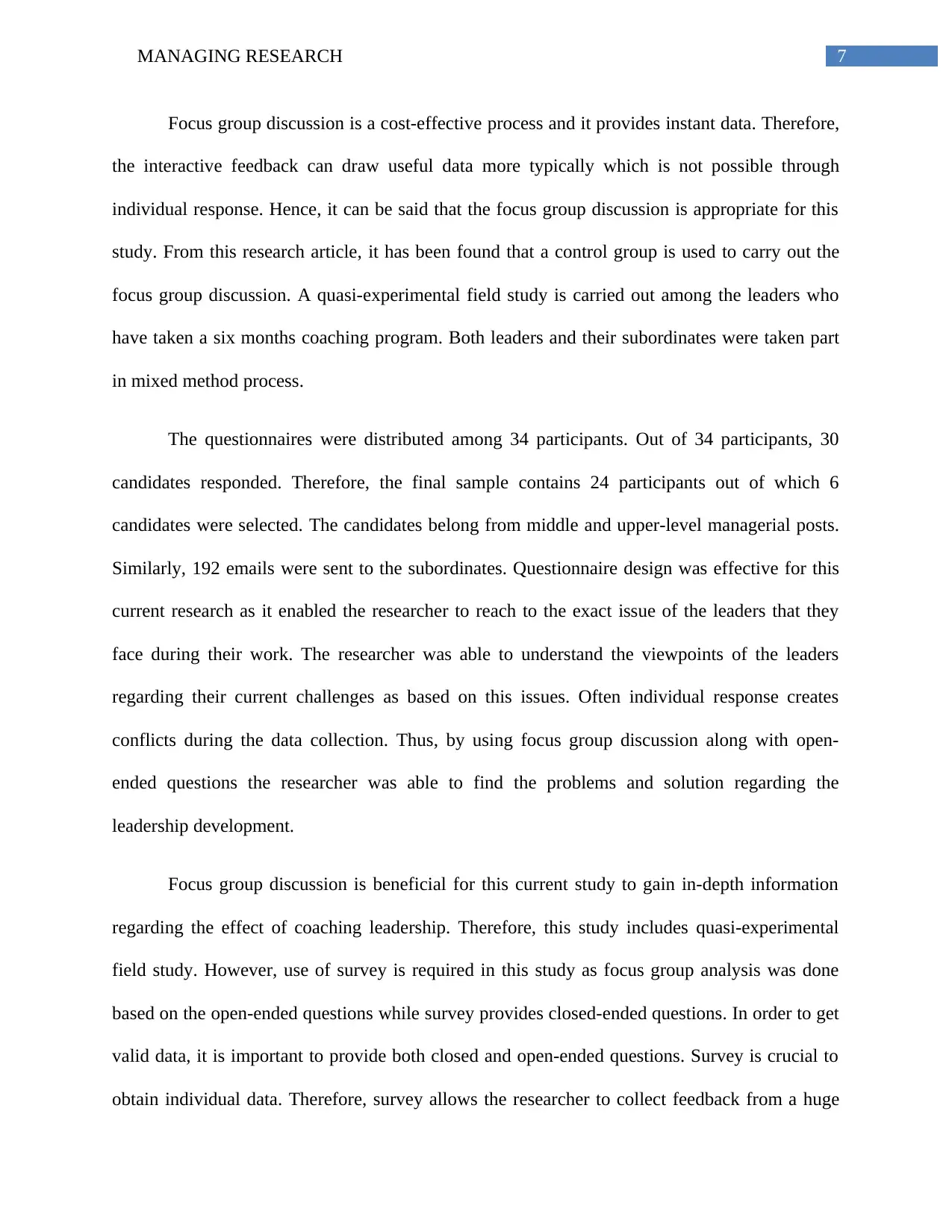
7MANAGING RESEARCH
Focus group discussion is a cost-effective process and it provides instant data. Therefore,
the interactive feedback can draw useful data more typically which is not possible through
individual response. Hence, it can be said that the focus group discussion is appropriate for this
study. From this research article, it has been found that a control group is used to carry out the
focus group discussion. A quasi-experimental field study is carried out among the leaders who
have taken a six months coaching program. Both leaders and their subordinates were taken part
in mixed method process.
The questionnaires were distributed among 34 participants. Out of 34 participants, 30
candidates responded. Therefore, the final sample contains 24 participants out of which 6
candidates were selected. The candidates belong from middle and upper-level managerial posts.
Similarly, 192 emails were sent to the subordinates. Questionnaire design was effective for this
current research as it enabled the researcher to reach to the exact issue of the leaders that they
face during their work. The researcher was able to understand the viewpoints of the leaders
regarding their current challenges as based on this issues. Often individual response creates
conflicts during the data collection. Thus, by using focus group discussion along with open-
ended questions the researcher was able to find the problems and solution regarding the
leadership development.
Focus group discussion is beneficial for this current study to gain in-depth information
regarding the effect of coaching leadership. Therefore, this study includes quasi-experimental
field study. However, use of survey is required in this study as focus group analysis was done
based on the open-ended questions while survey provides closed-ended questions. In order to get
valid data, it is important to provide both closed and open-ended questions. Survey is crucial to
obtain individual data. Therefore, survey allows the researcher to collect feedback from a huge
Focus group discussion is a cost-effective process and it provides instant data. Therefore,
the interactive feedback can draw useful data more typically which is not possible through
individual response. Hence, it can be said that the focus group discussion is appropriate for this
study. From this research article, it has been found that a control group is used to carry out the
focus group discussion. A quasi-experimental field study is carried out among the leaders who
have taken a six months coaching program. Both leaders and their subordinates were taken part
in mixed method process.
The questionnaires were distributed among 34 participants. Out of 34 participants, 30
candidates responded. Therefore, the final sample contains 24 participants out of which 6
candidates were selected. The candidates belong from middle and upper-level managerial posts.
Similarly, 192 emails were sent to the subordinates. Questionnaire design was effective for this
current research as it enabled the researcher to reach to the exact issue of the leaders that they
face during their work. The researcher was able to understand the viewpoints of the leaders
regarding their current challenges as based on this issues. Often individual response creates
conflicts during the data collection. Thus, by using focus group discussion along with open-
ended questions the researcher was able to find the problems and solution regarding the
leadership development.
Focus group discussion is beneficial for this current study to gain in-depth information
regarding the effect of coaching leadership. Therefore, this study includes quasi-experimental
field study. However, use of survey is required in this study as focus group analysis was done
based on the open-ended questions while survey provides closed-ended questions. In order to get
valid data, it is important to provide both closed and open-ended questions. Survey is crucial to
obtain individual data. Therefore, survey allows the researcher to collect feedback from a huge
Paraphrase This Document
Need a fresh take? Get an instant paraphrase of this document with our AI Paraphraser
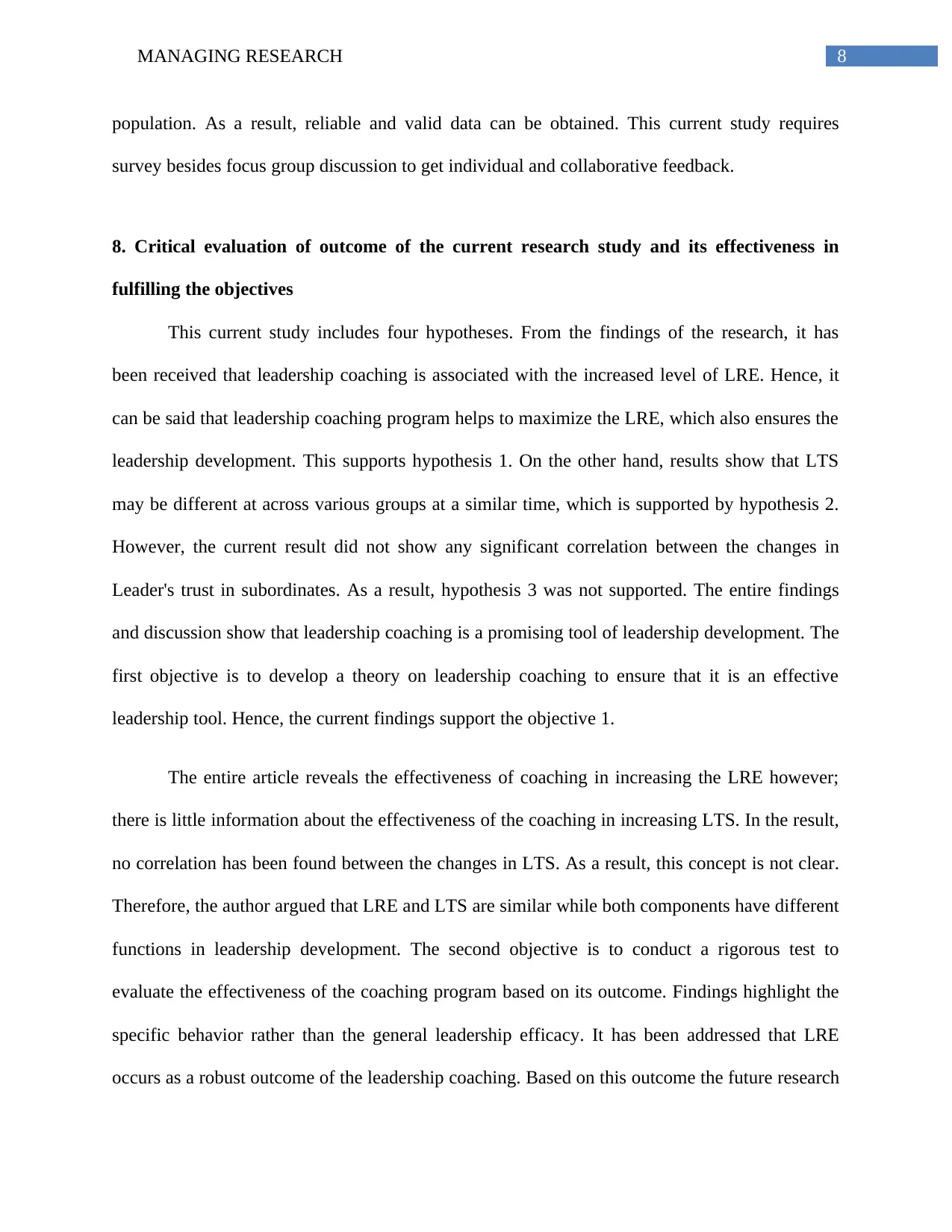
8MANAGING RESEARCH
population. As a result, reliable and valid data can be obtained. This current study requires
survey besides focus group discussion to get individual and collaborative feedback.
8. Critical evaluation of outcome of the current research study and its effectiveness in
fulfilling the objectives
This current study includes four hypotheses. From the findings of the research, it has
been received that leadership coaching is associated with the increased level of LRE. Hence, it
can be said that leadership coaching program helps to maximize the LRE, which also ensures the
leadership development. This supports hypothesis 1. On the other hand, results show that LTS
may be different at across various groups at a similar time, which is supported by hypothesis 2.
However, the current result did not show any significant correlation between the changes in
Leader's trust in subordinates. As a result, hypothesis 3 was not supported. The entire findings
and discussion show that leadership coaching is a promising tool of leadership development. The
first objective is to develop a theory on leadership coaching to ensure that it is an effective
leadership tool. Hence, the current findings support the objective 1.
The entire article reveals the effectiveness of coaching in increasing the LRE however;
there is little information about the effectiveness of the coaching in increasing LTS. In the result,
no correlation has been found between the changes in LTS. As a result, this concept is not clear.
Therefore, the author argued that LRE and LTS are similar while both components have different
functions in leadership development. The second objective is to conduct a rigorous test to
evaluate the effectiveness of the coaching program based on its outcome. Findings highlight the
specific behavior rather than the general leadership efficacy. It has been addressed that LRE
occurs as a robust outcome of the leadership coaching. Based on this outcome the future research
population. As a result, reliable and valid data can be obtained. This current study requires
survey besides focus group discussion to get individual and collaborative feedback.
8. Critical evaluation of outcome of the current research study and its effectiveness in
fulfilling the objectives
This current study includes four hypotheses. From the findings of the research, it has
been received that leadership coaching is associated with the increased level of LRE. Hence, it
can be said that leadership coaching program helps to maximize the LRE, which also ensures the
leadership development. This supports hypothesis 1. On the other hand, results show that LTS
may be different at across various groups at a similar time, which is supported by hypothesis 2.
However, the current result did not show any significant correlation between the changes in
Leader's trust in subordinates. As a result, hypothesis 3 was not supported. The entire findings
and discussion show that leadership coaching is a promising tool of leadership development. The
first objective is to develop a theory on leadership coaching to ensure that it is an effective
leadership tool. Hence, the current findings support the objective 1.
The entire article reveals the effectiveness of coaching in increasing the LRE however;
there is little information about the effectiveness of the coaching in increasing LTS. In the result,
no correlation has been found between the changes in LTS. As a result, this concept is not clear.
Therefore, the author argued that LRE and LTS are similar while both components have different
functions in leadership development. The second objective is to conduct a rigorous test to
evaluate the effectiveness of the coaching program based on its outcome. Findings highlight the
specific behavior rather than the general leadership efficacy. It has been addressed that LRE
occurs as a robust outcome of the leadership coaching. Based on this outcome the future research
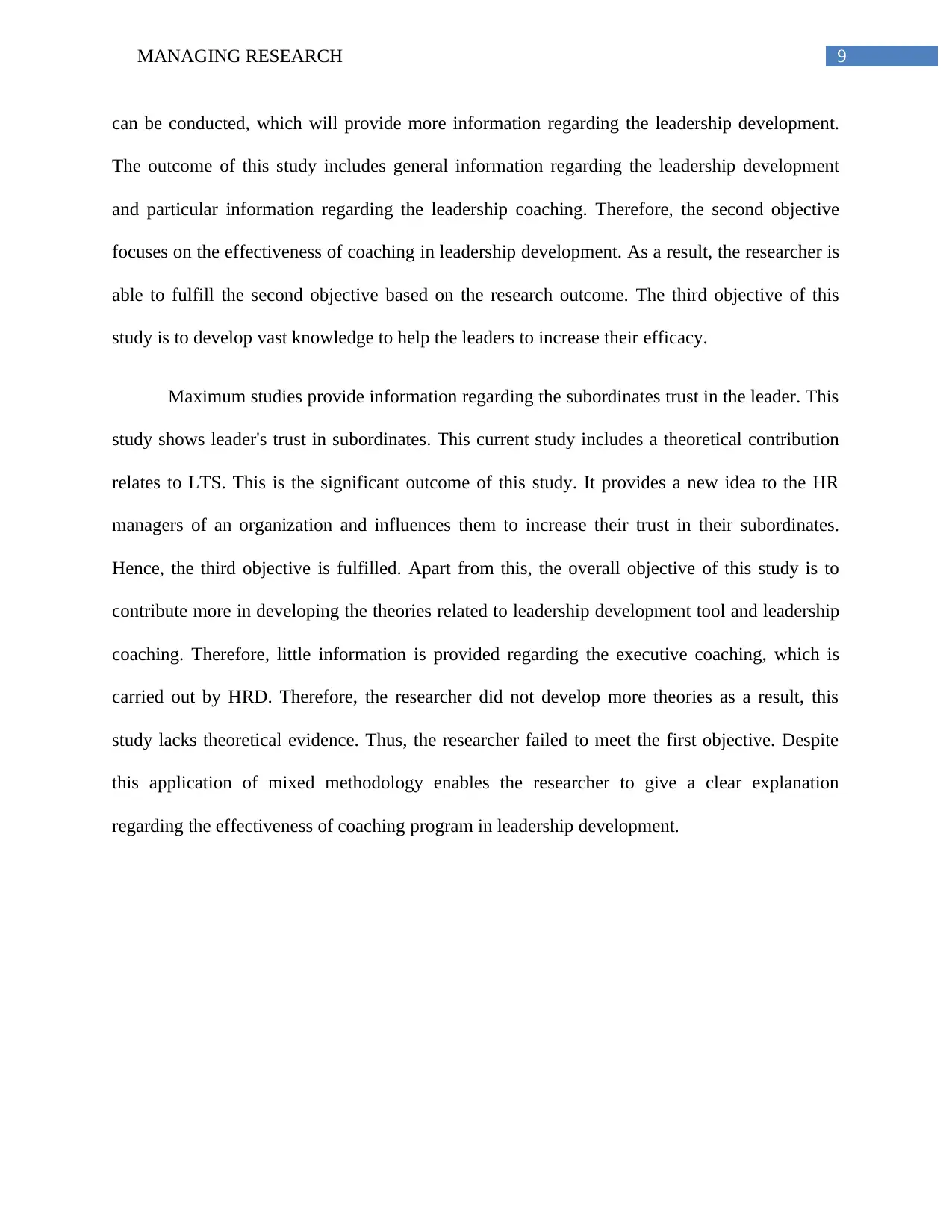
9MANAGING RESEARCH
can be conducted, which will provide more information regarding the leadership development.
The outcome of this study includes general information regarding the leadership development
and particular information regarding the leadership coaching. Therefore, the second objective
focuses on the effectiveness of coaching in leadership development. As a result, the researcher is
able to fulfill the second objective based on the research outcome. The third objective of this
study is to develop vast knowledge to help the leaders to increase their efficacy.
Maximum studies provide information regarding the subordinates trust in the leader. This
study shows leader's trust in subordinates. This current study includes a theoretical contribution
relates to LTS. This is the significant outcome of this study. It provides a new idea to the HR
managers of an organization and influences them to increase their trust in their subordinates.
Hence, the third objective is fulfilled. Apart from this, the overall objective of this study is to
contribute more in developing the theories related to leadership development tool and leadership
coaching. Therefore, little information is provided regarding the executive coaching, which is
carried out by HRD. Therefore, the researcher did not develop more theories as a result, this
study lacks theoretical evidence. Thus, the researcher failed to meet the first objective. Despite
this application of mixed methodology enables the researcher to give a clear explanation
regarding the effectiveness of coaching program in leadership development.
can be conducted, which will provide more information regarding the leadership development.
The outcome of this study includes general information regarding the leadership development
and particular information regarding the leadership coaching. Therefore, the second objective
focuses on the effectiveness of coaching in leadership development. As a result, the researcher is
able to fulfill the second objective based on the research outcome. The third objective of this
study is to develop vast knowledge to help the leaders to increase their efficacy.
Maximum studies provide information regarding the subordinates trust in the leader. This
study shows leader's trust in subordinates. This current study includes a theoretical contribution
relates to LTS. This is the significant outcome of this study. It provides a new idea to the HR
managers of an organization and influences them to increase their trust in their subordinates.
Hence, the third objective is fulfilled. Apart from this, the overall objective of this study is to
contribute more in developing the theories related to leadership development tool and leadership
coaching. Therefore, little information is provided regarding the executive coaching, which is
carried out by HRD. Therefore, the researcher did not develop more theories as a result, this
study lacks theoretical evidence. Thus, the researcher failed to meet the first objective. Despite
this application of mixed methodology enables the researcher to give a clear explanation
regarding the effectiveness of coaching program in leadership development.
⊘ This is a preview!⊘
Do you want full access?
Subscribe today to unlock all pages.

Trusted by 1+ million students worldwide
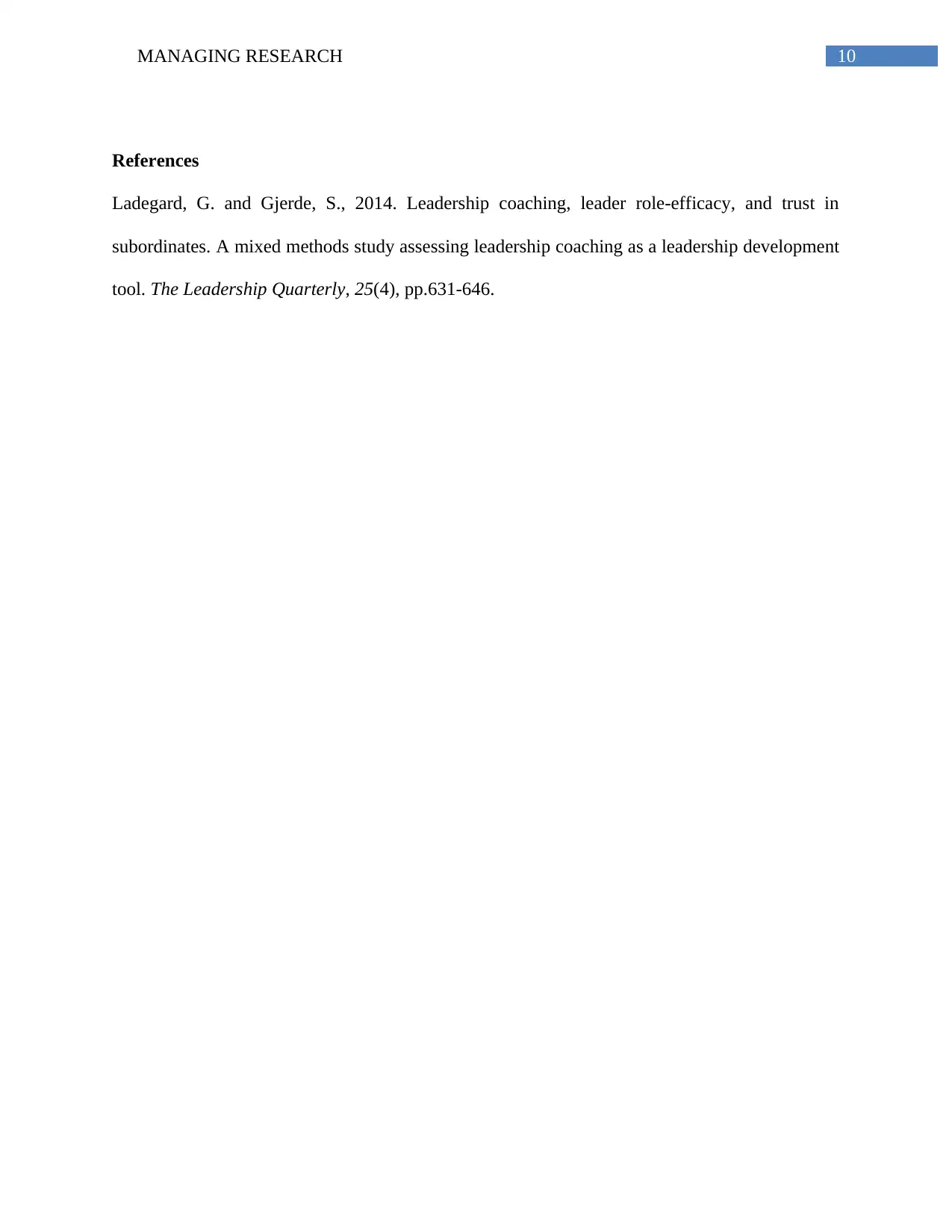
10MANAGING RESEARCH
References
Ladegard, G. and Gjerde, S., 2014. Leadership coaching, leader role-efficacy, and trust in
subordinates. A mixed methods study assessing leadership coaching as a leadership development
tool. The Leadership Quarterly, 25(4), pp.631-646.
References
Ladegard, G. and Gjerde, S., 2014. Leadership coaching, leader role-efficacy, and trust in
subordinates. A mixed methods study assessing leadership coaching as a leadership development
tool. The Leadership Quarterly, 25(4), pp.631-646.
1 out of 10
Related Documents
Your All-in-One AI-Powered Toolkit for Academic Success.
+13062052269
info@desklib.com
Available 24*7 on WhatsApp / Email
![[object Object]](/_next/static/media/star-bottom.7253800d.svg)
Unlock your academic potential
Copyright © 2020–2026 A2Z Services. All Rights Reserved. Developed and managed by ZUCOL.




